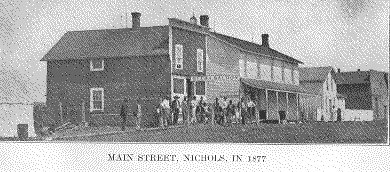
From Iowa Public Television, "Lost In History: Alexander Clark," -- In the 1860s, shortly after the Civil War, a black teenager from Muscatine, Iowa tried to enroll in the local high school. She was denied admission because of her color. Her father sued and won. And when the school board challenged the decision in the Iowa Supreme Court, he won again. Because of those actions, Iowa's schools were desegregated more than 85 years before the rest of the nation officially outlawed school segregation. Despite his historic court victory, his prominent anti-slavery role, his recruitment of black soldiers for the Union side in the Civil War and his appointment as the U.S. ambassador to Liberia, Alexander Clark has been all but lost from history. After a chance occurrence 35 years ago, another Muscatine man, a white man, launched a campaign to restore Clark's place in history. The cause came to consume his life. (source: Iowa PBS)
A Father Fights For Equal Rights -- On September 12, 1867, 12-year-old Susan Clark was denied admission to Muscatine's Second Ward Common School Number 2 because she was black. Her father, Alexander Clark, a determined businessman of Muscatine, acted to resist racism and the segregation of Iowa’s schools. How did he do that?
The World Was His School -- Alexander Clark was born in Pennsylvania in 1826. He was a good student and as a child learned the value of education. When he was 13 years old, Alexander went to live with an uncle in Cincinnati. There he learned to be a barber. In 1842 when he was just 16 he came to live in the town of Muscatine and set up a business as a barber. At this time Iowa was not yet a state. The area we now know as Iowa was part of a larger tract of land known as the Iowa Territory. As a businessman, Mr. Clark invested his money and became a property owner. His business grew as the young city of Muscatine developed.
In 1848, Alexander Clark married Catherine Griffin of Iowa City. They believed schooling was important and wanted their children to receive the best education possible. But many Iowa towns had separate schools for black students. Alexander and Catherine thought this was wrong. So in 1868, he retired from his barbering business and spent the rest of his life in public service. Much of his service involved resisting racism and segregation while fighting for equal rights.

Mr. Clark Fights for Equal Rights -- Alexander Clark became a leader in the equal rights movement in Iowa. Following the Civil War, he went with a group of people to Des Moines and talked with legislators about changing language in the Constitution of the State of Iowa. The group was successful, and in 1868 the word "white" was dropped from the Constitution, which meant that black men could vote.
Alexander and Catherine’s daughter Susan, attended the African Methodist Episcopal African School at this time. She was a good student, and when she was 12 years old Susan was ready for more advanced schooling. So Susan's father decided she should go to the public schools to continue her education. However, Susan was denied admission to the Muscatine Public Schools because she was black.

Alexander Clark acted quickly. He filed suit against the school board. The case went to the Iowa Supreme Court, which ruled that the school board, "cannot deny a youth admission to any particular school, because of ... color, nationality, religion or the like." Susan along with her sister Rebecca and their brother Alexander Jr., went on to graduate from Muscatine High School.
Alexander, Jr. continued his education and graduated from the University of Iowa Law School in 1880. His father, Alexander Clark decided to study law, as well. He graduated from the University of Iowa Law School in 1884, at the age of 58.

The President Calls on Mr. Clark -- For many years Alexander Clark had been active in politics fighting for equal rights. Now he spent more and more time working for the Republican Party. He became a highly respected member, and in 1890 President Benjamin Harrison appointed him Resident Minister and Consul General to Liberia. Mr. Clark traveled the long distance to Africa early in 1891. There he became ill with a fever and died.
They Led the Way -- Alexander Clark is remembered for his work in helping to desegregate Iowa’s schools. Although not until 1874 were all of Iowa’s schools desegregated, Alexander Clark and his daughter, Susan, led the way for this very important change.
Adapted from original article in The Goldfinch 2, No. 4 (April 1981). Iowa City: State Historical Society of Iowa. (source: PBS)


You really make it seem really easy with your presentation however I to find this
ReplyDeletematter to be actually something which I believe I would by no means understand.
It kind of feels too complicated and extremely huge for me.
I'm taking a look ahead to your next put up, I will try to get the hang of it!
Also visit my page: Cheap NFL Jerseys
For most up-to-date information you have to visit the
ReplyDeleteweb and on web I found this web page as a best web page for most up-to-date
updates.
My web page: http://submissions.takemetotravel.com/terms-conditions?replytocom=360
Meet and Greet: This is generally introduction of often the car sales
ReplyDeletecharacter to the extent car buyer. It could be any number
to reasons depending located on the car.
my site - adwokat warszawa
You may think that this improved performance will require
ReplyDeletemore maintenance. Apple, for instance, is actually far the respected maker of very easily
music players.
Feel free to visit my web site :: adwokat warszawa
sjjsjsj
ReplyDelete